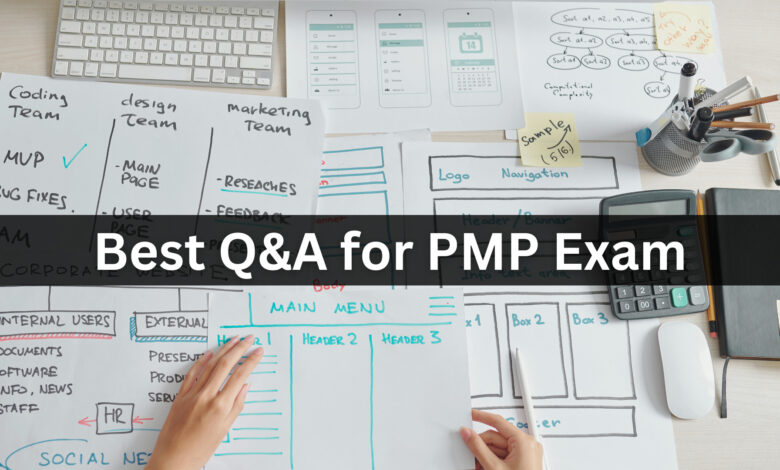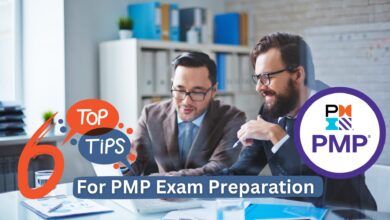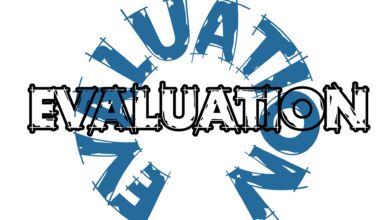Exams & Best PracticesPM QuestionsProject Management Questions
Best Q&A for PMP Exam

Preparing for the PMP exam requires a thorough understanding of the various sections and key concepts. Below are 50 questions and answers divided into five sections, each covering different aspects of the PMP exam. Here are some of the best Q&A for PMP Exam.
Section 1: Initiating – best Q&A for PMP Exam.

- Q: What is the primary purpose of the project charter? A: To formally authorize a project and give the project manager authority to apply resources to project activities.
- Q: Who is responsible for creating the project charter? A: Typically, it is created by the project sponsor or the initiator.
- Q: What is a stakeholder register? A: A document that identifies project stakeholders and includes relevant information about their interests and impact on the project.
- Q: What are the key inputs to the Develop Project Charter process? A: Business documents, agreements, enterprise environmental factors, and organizational process assets.
- Q: What is a project statement of work (SOW)? A: A narrative description of products, services, or results to be delivered by the project.
- Q: What is the significance of the benefits management plan? A: It outlines how and when the benefits of the project will be delivered and measured.
- Q: What are enterprise environmental factors? A: Conditions, not under the control of the project team, that influence, constrain, or direct the project.
- Q: What is the purpose of a business case? A: To justify the investment in the project and provide the necessary information for decision-makers to approve the project charter.
- Q: Define project constraints. A: Any restrictions that limit the project’s options, such as time, cost, scope, quality, resources, and risk.
- Q: What is the role of a project sponsor? A: The person or group who provides resources and support for the project and is accountable for enabling success.
Section 2: Planning – best Q&A for PMP Exam.

- Q: What is the main output of the Develop Project Management Plan process? A: The project management plan.
- Q: What is a work breakdown structure (WBS)? A: A hierarchical decomposition of the total scope of work to accomplish project objectives.
- Q: What is the critical path method (CPM)? A: A schedule network analysis technique used to determine the sequence of activities that dictates the total project duration.
- Q: What is a project scope statement? A: A detailed description of the project scope, including deliverables, assumptions, and constraints.
- Q: Define resource leveling. A: A technique in which start and finish dates are adjusted based on resource constraints to balance demand with available supply.
- Q: What is risk management planning? A: The process of defining how to conduct risk management activities for a project.
- Q: What are project baselines? A: Approved versions of the scope, schedule, and cost plans, used to measure project performance.
- Q: What is stakeholder analysis? A: A technique of systematically gathering and analyzing quantitative and qualitative information to determine whose interests should be considered throughout the project.
- Q: What is a quality management plan? A: A component of the project management plan that describes how an organization’s quality policies will be implemented.
- Q: What is the purpose of the communications management plan? A: To define the communication requirements and how information will be distributed and managed.
Click here to check Important Mcqs in Project Management with Answers
Section 3: Executing

- Q: What is the main focus during the executing phase of a project? A: To complete the work defined in the project management plan to meet project objectives.
- Q: What is the role of a project manager in team development? A: To improve the competencies, team interaction, and overall team environment to enhance project performance.
- Q: What is a kick-off meeting? A: An introductory meeting to set the tone for the project and clarify roles and responsibilities.
- Q: What is change management? A: The process of identifying, documenting, and approving or rejecting changes to the project scope, schedule, and costs.
- Q: What is a procurement management plan? A: A plan that describes how the procurement processes will be managed from developing procurement documentation through contract closure.
- Q: What is the purpose of a stakeholder engagement plan? A: To identify strategies to effectively engage stakeholders throughout the project lifecycle.
- Q: Define direct and manage project work. A: The process of leading and performing the work defined in the project management plan and implementing approved changes.
- Q: What is quality assurance? A: The process of auditing the quality requirements and results from quality control measurements to ensure standards are met.
- Q: What is the main output of the Manage Project Knowledge process? A: Lessons learned register.
- Q: What is resource acquisition? A: The process of obtaining team members, facilities, equipment, materials, and other resources necessary to complete project work.
Section 4: Monitoring and Controlling

- Q: What is earned value management (EVM)? A: A methodology used to measure project performance against scope, schedule, and cost baselines.
- Q: What is the purpose of the Perform Integrated Change Control process? A: To review all change requests, approve or deny changes, and manage changes to deliverables and baselines.
- Q: What is variance analysis? A: A technique for determining the cause and degree of difference between the baseline and actual performance.
- Q: Define scope validation. A: The process of formalizing acceptance of the completed project deliverables.
- Q: What is a risk audit? A: A review of the risk management process to ensure that risks are identified, assessed, and controlled appropriately.
- Q: What is the main focus of the Control Quality process? A: To monitor and record results of executing the quality management activities to assess performance and recommend necessary changes.
- Q: What is cost performance index (CPI)? A: A measure of the cost efficiency of budgeted resources, calculated as EV/AC (Earned Value/Actual Cost).
- Q: Define schedule performance index (SPI). A: A measure of schedule efficiency, calculated as EV/PV (Earned Value/Planned Value).
- Q: What is a project performance report? A: A document that provides information on project status, progress, and forecasts.
- Q: What is the significance of issue logs? A: They document and track issues that arise during the project, facilitating timely resolution.
Section 5: Closing

- Q: What is the main objective of the Close Project or Phase process? A: To finalize all activities across all project management process groups to formally complete the project or phase.
- Q: What are the key outputs of the Close Project or Phase process? A: Final product, service, or result transition and project or phase closure documents.
- Q: What is a lessons learned register? A: A document that captures knowledge gained during a project to improve future projects.
- Q: Define project final report. A: A document that provides a summary of the project performance, including accomplishments, challenges, and key lessons learned.
- Q: What is contract closure? A: The process of completing and settling the terms of the contract, including resolving any open items.
- Q: What is administrative closure? A: The process of generating, gathering, and disseminating information to formalize project completion.
- Q: What is the purpose of stakeholder satisfaction surveys? A: To gather feedback from stakeholders on the project’s success and areas for improvement.
- Q: What is archival of project documents? A: The process of storing project documents and records for future reference.
- Q: What is the significance of final performance reporting? A: To provide a complete and accurate account of project performance and outcomes.
- Q: What are formal acceptance criteria? A: The conditions under which deliverables are considered complete and accepted by the customer or sponsor.




